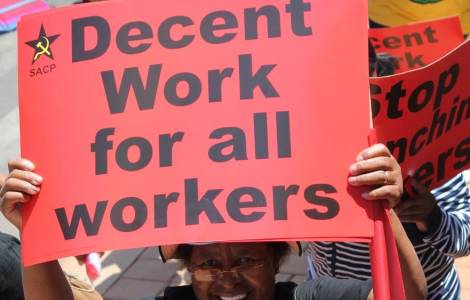
Johannesburg (Agenzia Fides) - Almost 30 years after the end of apartheid and the establishment of democracy, the process of national reconciliation is threatened by the growth of social inequalities and persistent poverty. This is what is highlighted by Father Peter John Pearson, in charge of relations with Parliament for the Southern African Catholic Bishops' Conference (SACBC) the conference that brings together the bishops of South Africa, Botswana and Eswatini. In an interview with Newzroom Afrika, Father Pearson warns that economic inequalities have reached such depths that the gains of the first 10 years after the end of apartheid "have faded away." As a result, the national reconciliation process is also affected, since, as the priest highlights, "it advances to the extent that people benefit from it". "We are in a dangerous period, as things we took for granted are falling apart," says Father Pearson, who notes that tensions related to racial issues are on the rise, but above all tensions related to economic inequalities, such as serious income disparities and rising unemployment.
In 2024, South Africans will be called to the polls to renew Parliament and provincial bodies (see Fides, 15/12/2023). With polls reflecting the distrust of the majority of South Africans towards their politicians, Father Pearson highlights some positive signs. Specifically, according to the priest, there is an emergence of some political minorities who seem intent on bringing about change in South African politics. "Political changes," he says, "are usually led by a very small initial minority." The main cause of this situation, according to Father Pearson, is the political system, incapable of regenerating itself and stopping the rampant corruption within it. However, according to him, the economic system and civil society also share responsibility, especially for not opposing political deviations and remaining silent in the face of corruption and poor governance. The most recent data reveal that South Africa has the highest income inequality in the world, with a Gini coefficient of approximately 0.67. The Gini coefficient is a statistical measure widely used to evaluate the distribution of income in the population of a country, ranging between 0 and 1. A coefficient of 1 indicates perfect inequality, where one individual monopolizes all the national income. In contrast, a coefficient of 0 indicates perfect equality, where the country's income is distributed equally among all its citizens. Economic inequalities in South Africa are marked by the high unemployment rate, officially 32.6%, a figure that does not take into account those who have stopped looking for work. Most workers earn low incomes, with the richest 10% of South African households accounting for approximately 52% of total national spending, while the poorest 10% contribute only 0.8% of total spending. (L.M.) (Agenzia Fides, 21/12/2023)